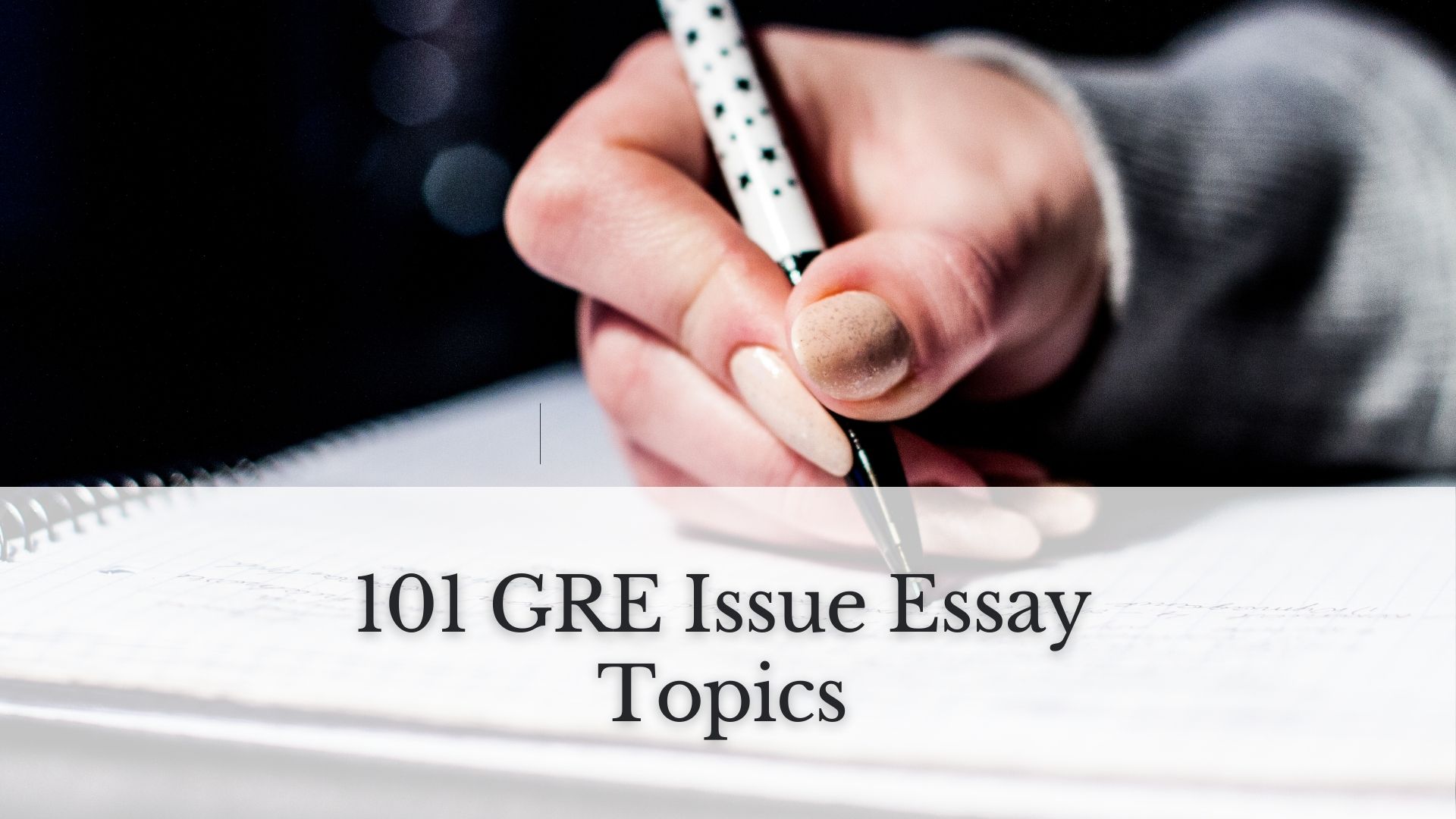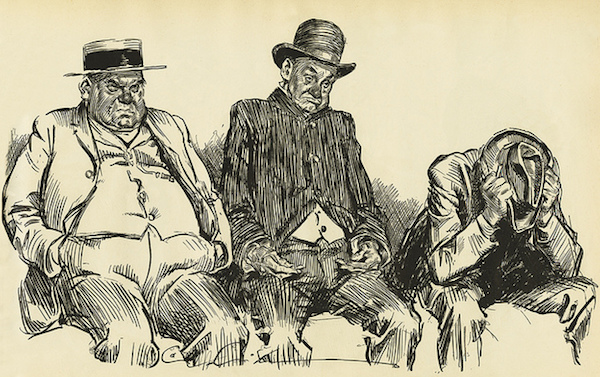- How It Works
- All Projects
- Top-Rated Pages
- Admission essay writing
- Book report writing
- Cheap essay writing
- Coursework writing
- Dissertation writing
- Essay editing
- MBA essay writing
- Scholarship essay writing
- Term paper writing
- Write my essay
- Free sample essays
- Writing blog

101 GRE Issue Essay Topics For Top Students

When educators ask students to write about GRE issue essay topics, some ask, what is a GRE essay? A GRE issue essay is like a 5-paragraph essay in terms of structure, but a student can write 4 to 5 paragraphs. When reading this essay, the educator or the audience evaluates the skill the writer uses to address specific instructions while articulating and developing an argument supporting their issue evaluation. An adequately organized essay is easy for the audience to read and comprehend.
While developing the points, a reader should pepper their analysis with specific words for guiding readers through the entire argument. Such terms include although, because, however, furthermore, and alternatively to catch the audience’s attention. It’s crucial to note that you’ll have around 30 minutes to write this essay. Therefore, selecting the right topic can make all the difference. Here are sample prompts that you can use to practice drafting this essay.
GRE Issue Essay Sample Topics on Education
Students can address several issues in their essays using education topics. Here are some of the education topics that can serve as the GRE essays basis on education issues.
- Students should use part-time work to fund their education.
- All universities should make foreign language courses a graduation requirement regardless of the study field that a learner selects.
- Universities should limit the number of classes a learner can enroll in during the academic term.
- Learners shouldn’t use loans to cater to their living expenses or tuition anytime during their studies.
- The top priority for universities should be educating people in their cities or nearby areas while giving non-local students a secondary priority.
- Education can benefit people if they go back to school after spending time in the workforce.
- The basis of school policies should be what employers, teachers, and students want.
- Limiting classroom size can help students get adequate resources and support from their instructors.
- All university and college students can benefit from studying abroad for at least one term or semester.
- Every university or college should require learners to take different courses outside their study fields.
- When writing an essay on these prompts, focus on agreeing or disagreeing with the provided claim. Also, address the most compelling reasons with examples that the reader could use to challenge your stance.
GRE Prompts on Society and Technology
If you love addressing social and technological issues, this category has some of the best prompts for your essay.
- Universities should offer courses with at least one partial internet learning component to prepare learners for the contemporary world.
- Human activity and technology inevitably lead to more significant environmental damage and pollution.
- Developing countries’ leaders should focus on modernization.
- Investing in life-saving technology is valuable than any other investment in technology around luxury or entertainment.
- Technological advancements’ primary goal should be increasing people’s efficiency to allow them more leisure time.
- The possibility of supervised space travel past the earth’s moon is doubtful.
- Some argue that technological breakthroughs occur by chance and surprise discoveries, but some say well-planned, deliberate research is the only way to achieve technological advancement.
Consider any of these topics and then tweak or develop them creatively to respond to the issue in question.
GRE Writing Topics on Philosophy
Do you love philosophy? If yes, this category has some of the best GRE topics from which you can select the issue to address in your essay.
- Humans learn valuable lessons from struggling with limitations instead of enjoying their successes.
- Opportunities don’t come by luck. Instead, successful individuals seek opportunities continuously.
- The best teaching practice is praising positive actions while ignoring negative ones.
- Governments should provide university and college education to all students free of charge.
- Individuals can’t care for others without taking care of themselves.
- A society’s well-being improves when people question those in authority. Countries should have flexible laws that consider different times, places, and circumstances.
- A country should require all learners to study a similar curriculum until college.
- A person’s behavior is mainly dependent on forces rather than their choices.
- Formal education restrains the spirit and mind of a person instead of setting them free.
- Self-criticism is accurate and valuable than criticism from other people.
- Friendships among people that share a common space or goal, like classmates, neighbors, and co-workers, are more fulfilling.
Pick an example of a GRE topic in this category and then tweak it a little to use it as your essay title.
GRE Pool of Issue Topics
Perhaps, you need several topics that you can use to practice writing this essay. This category has a pool of issues that can serve as topics for your papers.
- Group assignments should replace a significant percentage of lecture-based instructions in university and college courses.
- In government, business, and education, it’s appropriate to be skeptical of your new leaders until they prove they deserve your trust.
- Some individuals argue that creative fields’ success requires perseverance and hard work. Others say it mainly needs innate talents that people don’t acquire in school.
- Presenting statistics and facts instead of emotional arguments is the best way approach for persuading people.
- The government should provide free college or university education to learners that these institutions admit but lack tuition.
- Countries should implement laws for preserving their wilderness areas even if humans can develop them for economic gains.
- It’s not easy to contribute to any field significantly without strong influence from past achievements.
- In politics, government, education, and business, the people in power should retire after five years of service.
- Some individuals believe that arts require government funding to flourish and reach all people, while others think this funding threatens art’s integrity.
- Governments should offer financial support to significant cities for them to thrive.
- Scandals focus human attention on issues in ways that no reformer or speaker can ever do.
- Learning institutions should dissuade learners from pursuing study fields where their success is unlikely.
- Studying the major cities of a town helps you to understand its crucial characteristics.
- People don’t act purely for others’ benefit.
- People consider historical learning an objective pursuit, but it requires creativity.
- Some individuals believe that empathy and understanding are the most crucial effective leader’s quality while others argue that a leader should be demanding and rigorous in their students’ expectations.
- Some people express boredom with a self-satisfaction sense while it should cause embarrassment.
- Imposing strict limits on the trash amount every household generates is the best approach for solving environmental problems arising from consumer-generated waste.
- Some individuals argue that politics’ goal should be pursuing an idea, while others believe that finding common ground and achieving a reasonable consensus should be the objective.
- The best argument test is the ability to convince the person with the opposing viewpoint.
- The people’s general welfare is the best indication of a country’s greatness rather than the achievements of artists, scientists, or rulers.
- No study field can achieve significant advancement without incorporating experience and knowledge from the other areas.
This GRE pool of argument topics should help you practice writing this essay. Try with several prompts in this category to enhance your argumentative and writing skills.
GRE Analytical Writing Topics
Analytical writing tests the ability of the learner to analyze issues and think critically. It assesses a learner’s ability to support and articulate complex ideas by constructing and evaluating arguments. Here’s a list of sample GRE analytical writing prompts to consider for your essays.
- Hospital statistics about people that visit the emergency room following roller-skating accidents show the need for additional protective equipment.
- The best ideas come from a passionate commonplace things interest.
- Research indicates that water sports usage is on the rise. Therefore, cities should spend more money on riverside recreational facilities.
Each of these prompts requires you to analyze the presented issue and then come up with an argument.
GRE Practice Essay Prompts
Maybe you want to practice with different prompts in readiness for an upcoming test. In that case, consider these prompts.
- A common perception is that excellent personal conduct is a quality of a good leader. But some people have a conflicting belief that personal morality doesn’t matter, provided a leader doesn’t break the law and executes their duties effectively.
- Some artists and scholars believe that color photography has removed the realism need in artistic painting, while others feel realistic artwork remains worthwhile and valuable.
- People should elect leaders in significant power positions rather than appoint them.
- A school of thought argues that management should promote experienced workers. But some businesses opt to select managers depending on their leadership skills rather than experience.
- Governments should employ accomplished filmmakers to develop films with crucial public messages.
- Enterprises should submit to the government’s close monitoring and regulation.
- Many countries have leaders prioritizing economic stability and development over environmental concerns. These leaders are at odds with most national leaders that feel the long-term environment’s health should be the basis of financial decisions.
- Famous art forms like storybook illustrations and advertising images will never achieve artistic merits like fine arts like sculptures and gallery paintings.
- A city’s life quality can’t be good unless experts plan it correctly.
- Cities shouldn’t allow private companies to do business if most residents oppose their operations.
- Cities should regulate their parking and place limits on lots to reduce traffic congestion.
- The rapid increase in life pace today leads to more problems than humans can solve
- Students should question what educators teach them instead of accepting everything passively.
- People define themselves primarily by their identification with specific social groups.
- Governments shouldn’t fund scientific research with unclear consequences.
- Learning institutions should encourage learners to select study fields that make them fit for lucrative careers.
- Governments aim to solve immediate problems instead of dealing with anticipated, future issues.
- College learners should select study fields based on jobs’ availability rather than their interests and talents.
- Countries should implement flexible laws that consider different times, places, and circumstances.
- An ideal way to comprehend a society’s character is by examining its role models and heroes.
- Countries should have few restrictions on development and scientific research.
- Contemporary life’s conveniences and luxuries prevent individuals from becoming independent and strong people.
- In every inquiry field, the beginner is likely to make significant contributions than an expert.
- The best indicator of a great country is not its artists’ and rulers’ achievements but the general people’s welfare.
- Learners’ academic performance should be the basis of their teachers’ salaries.
- Society should aim to save the endangered species if their potential extinction is due to human activities.
- Things don’t get comprehensible as learners acquire additional knowledge. Instead, they become mysterious and complex.
- Progress requires people to discuss with those with contrasting viewpoints.
- Learning institutions should dissuade learners from venturing into study fields that are unlikely to give them jobs.
- Those living after individuals should decide their greatness, not their contemporaries.
- Society can’t regard a living woman or man as a hero any longer.
- High grades’ competition limits learning quality at all educational levels.
- Instructors should teach facts after learners have understood trends, concepts, and ideas that explain them.
- Humans learn more from people with whom they share views than those with contradicting opinions.
- Government employees should depend on their judgment instead of following the will of their superiors.
- Society should encourage young people to pursue realistic, long-term goals instead of seeking immediate recognition and fame.
- Any means for attaining a worthy goal are justifiable.
You can use any of these titles to practice and sharpen your writing skills.
ETS Essay Topics
If looking for the best ETS topics, this category has some ideas for you.
- The goals a person sets are the primary measure for true success.
- Happiness comes from seeking different and new experiences.
- Cities provide more secure living than less developed areas.
- Nations shouldn’t have fixed laws; instead, countries should have flexible rules that consider different places, times, and circumstances.
- Science should reassure while art upsets, and each should have value.
- Governments can impose laws limiting people’s behavior, but they can’t restrict human nature.
- Trusting intelligence alone can be dangerous.
- People disregard past, great works because they don’t address their current needs.
- Reading books in the television age is not crucial because people learn almost everything from watching television.
- Most specialists are highly overrated. For this reason, the world needs more generalists to offer broad perspectives.
This category also has some of the best GRE AWA topics. However, each title requires creativity to come up with a winning essay.
Get Professional Writing Assistance Online
Perhaps, you’re struggling with your essay, and you need expert writers to assist you. Maybe you don’t know how to write this essay, and you need a sample to guide you. In that case, use the internet to get fast and cheap assistance. Our crew has skilled writers with a proven track record of delivering quality essays at affordable prices. Contact us now if seeking the best essay writing help online. We guarantee you a custom essay that will impress the instructor to award you the best grade.

Leave a Reply Cancel reply
Your email address will not be published. Required fields are marked *
Save my name, email, and website in this browser for the next time I comment.
Have a team of vetted experts take you to the top, with professionally written papers in every area of study.
Testimonials
Free Resources
PrepScholar GRE Prep
Gre prep online guides and tips, 4 top-scoring gre sample essays, analyzed (issue + argument).
The best way to figure out how to get a high Analytical Writing score is to look at a GRE essay sample, but doing so without any guidance can be overwhelming. How do you show insight? Do typos affect your score? What’s a good way to keep your essay organized?
We’ll answer all these questions for you (and more!) in this article by analyzing four real GRE essay examples and highlighting the key features you’ll want to include in your own essays.
How to Use This Guide
Before we get to the GRE sample essays and their analyses, I’ll highlight two best ways to use this guide to improve your essay and get a great scoring essay yourself.
First, use the perfect-scoring sample GRE essays in this guide as models of possible ways to accomplish the essay tasks . By this, I don’t mean you should plagiarize entire sentences, paragraphs, or essays – that’s both wrong and against GRE code of conduct (it will disqualify your entire test if discovered). Plus, there are so many prompts (152 Issue prompts and 176 Argument ones) that it’s unlikely you’d be able to use any of these exact essays anyway.
What you can and should do is incorporate the features highlighted in the analyses below in your own essays. For instance, if you’ve been struggling with how to logically connect ideas within paragraphs in your own essays, take a look of some of the examples of logical connection I point out in this article and see how they fit within the context of the full essay. You can then practice replicating successful connections between ideas in your own practice essays.
The other main way to use this guide is in conjunction with the essay grading rubrics to help ferret out your writing weaknesses and work on them. Start with the rubrics for the Issue and Argument tasks and identify which criteria are most difficult for you to meet. Even if you can’t articulate precisely what your weakest spot is (e.g. failing to logically connect your ideas within paragraphs), you can at least narrow down the general rubric area you most struggle with (e.g. organization in general).
Once you’ve identified the general area you have the most trouble with, read the GRE essay examples and our analyses in this article to find concrete instances (rather than the abstract descriptions) of the rubric criteria. For more information about the different rubrics for the different essay tasks, read our articles on how to write perfect-scoring GRE Issue and Argument essays .
Quick side note: we've created the world's leading online GRE prep program that adapts to you and your strengths and weaknesses. Not sure what to study? Confused by how to improve your score? We give you minute by minute guide.
You don't NEED a prep program to get a great GRE score. But we believe PrepScholar is the best GRE prep program available right now , especially if you find it hard to organize your study schedule and don't know what to study .
Click here to learn how you can improve your GRE score by 7 points, guaranteed .

Because this article is on the longer side, we’ve created a table of contents to enable you to jump to a specific essay example or task type:
Table of Contents: GRE Essay Examples
Issue essay 1: technology and human ingenuity, issue essay 2: cooperation vs. competition, argument essay 1: mason city riverside recreation, argument essay 2: super screen movie advertising.
The first of the GRE sample essays we’ll be looking at is written in response to the following “Analyze an Issue” prompt:
As people rely more and more on technology to solve problems, the ability of humans to think for themselves will surely deteriorate.
Discuss the extent to which you agree or disagree with the statement and explain your reasoning for the position you take. In developing and supporting your position, you should consider ways in which the statement might or might not hold true and explain how these considerations shape your position.
The essay written on this Issue prompt takes the position that rather than hindering our abilities to think for themselves, technology will spur humanity on to achieve ever-greater things. The full text of this GRE essay sample can be found on the ETS website .
In this analysis, I’ll go over the different ways in which this essay meets the GRE essay rubric criteria for a perfect scoring Issue essay . The first of these rubric criteria I’ll be discussing is the way the author takes a clear and insightful stance on the issue in the essay.
The author’s position that instead of fearing new technology, we should embrace its possibilities is methodically articulated over the course of the entire essay, culminating in the essay’s conclusion with a full thesis statement (“There is no need to retreat to a Luddite attitude to new things, but rather embrace a hopeful posture to the possibilities that technology provides for new avenues of human imagination.”). Below is an outline of how the author expresses her thesis throughout the essay:
- Paragraph 1 : The author acknowledges “technology has revolutionized the world.”
- Paragraph 2 : The author explains the reasoning behind the statement in the prompt (“The assumption is that an increased reliance on technology negates the need for people to think creatively to solve previous quandaries”).
- Paragraph 3 : The author counters the reasoning she discussed in paragraph 2, writing that “reliance on technology does not necessarily preclude the creativity that marks the human species.”
- Paragraph 4 : The author advances her counterclaim one step further, stating that “technology frees the human imagination.”
- Paragraph 5 : The author further develops the idea from Paragraph 4, stating “By increasing our reliance on technology, impossible goals can now be achieved.”
- Paragraph 6 : This final paragraph concludes the essay with a fully articulated thesis that also sums up what went before: “There is no need to retreat to a Luddite attitude to new things, but rather embrace a hopeful posture to the possibilities that technology provides for new avenues of human imagination.”
The author’s straightforward explanations of her thinking and logic enhance the clarity of her position, while the nuanced content of the position itself demonstrates insight into the issue.

The next area a perfect-scoring Issue essay must demonstrate mastery of is the development of its position through compelling and persuasive examples and reasoning . The author of this essay accomplishes this task by providing examples to support each idea she discusses and, furthermore, explaining not only the content of the examples but also why the examples support her position.
Here’s an example from paragraph 5:
By increasing our reliance on technology, impossible goals can now be achieved. Consider how the late 20th century witnessed the complete elimination of smallpox. This disease had ravaged the human race since prehistorical days, and yet with the technology of vaccines, free thinking humans dared to imagine a world free of smallpox. Using technology, battle plans were drawn out, and smallpox was systematically targeted and eradicated.
In this example, the author begins by laying out the main idea to be discussed (impossible things can be achieved by relying more on technology). She then supports this idea with the example of the impossible problem of smallpox and the steps taken that led to its eradication.
The great thing about the way the author explains her reasoning and examples is the concision and precision with which she gets her information across. Rather than going off into a discussion about the damage caused by smallpox, or staying too vague by mentioning how “diseases” had been solved by the use of vaccines, the author chooses a specific example (smallpox) and mentions only the details relevant to proving her point . This kind of precise writing takes practice, but being able to effectively sum up an example and why it supports your position in just a couple of sentences is essential if you want to get a high score on the GRE Issue essay.

Focus, organization, and logical connections are the third criterion that a perfect-scoring essay needs to fulfill. In the case of this GRE essay sample, the author achieves this organization and focus by linking ideas both within paragraphs (as seen in the previous example) as well as between paragraphs . Let’s look at the way the author transitions between the end of paragraph four and the beginning of paragraph five:
The unlikely marriage of economics and medicine has healed tense, hyperinflation environments from South America to Eastern Europe.
This last example provides the most hope in how technology actually provides hope to the future of humanity. By increasing our reliance on technology, impossible goals can now be achieved.
The author connects the two paragraphs by continuing paragraph four’s discussion of ways human imagination has been pushed by technology (technology combining economics and medicine has solved a problem) with paragraph five’s exploration of how this example has led to achieving things previously considered impossible. The smoothness of the transition between the two paragraphs is effected both by presenting the content of the next paragraph as a logical progression from what was just discussed as well as by using language (“this last example”) that connects the two on a more superficial level.
By keeping paragraphs tightly linked on both the surface level of sentence structures as well as on the deeper level of content being discussed , the author of this essay also keeps her writing focused and cohesive.

Want to improve your GRE score by 7 points? We have the industry's leading GRE prep program. Built by world-class instructors with 99th percentile GRE scores , the program learns your strengths and weaknesses through machine learning data science, then customizes your prep program to you so you get the most effective prep possible.
Try our 5-day full access trial for free:
The last quality a perfect-scoring essay must demonstrate is precision of language and flow in writing . The author of this GRE Analytical Writing sample fulfills this requirement by using language to precisely and economically convey meaning throughout her essay. Here’s one example of precise and effective use of language in the essay:
This disease had ravaged the human race since prehistorical days, and yet with the technology of vaccines, free thinking humans dared to imagine a world free of smallpox.
In this excerpt, the author uses the evocative word “ravaged” to show the dire extent of the problem solved by technology, reinforcing that the issue was previously considered impossible to cope with. She also uses the phrase “humans dared to imagine” in this sentence, which ties the example being discussed back to the previous paragraph’s discussion of human imagination.
While there are a couple of minor errors in this excerpt (“prehistorical” should be “prehistoric,” “free thinking” should be “free-thinking”), they do not significantly change the meaning of the author’s words and so do not detract from the overall effectiveness of the author’s language.

Return to Table of Contents
The second of the GRE Issue essay samples I’ll be analyzing is written in response to the following prompt about the values of cooperation vs. competition:
“The best way for a society to prepare its young people for leadership in government, industry, or other fields is by instilling in them a sense of cooperation, not competition.”
Write a response in which you discuss the extent to which you agree or disagree with the claim. In developing and supporting your position, be sure to address the most compelling reasons or examples that could be used to challenge your position.
The sample Issue essay written in response to this topic takes the stance that cooperation, not competition, is a preferable value to instill in young people in preparation for government. You can read the full essay on page 108 of this PDF . Read on for a discussion of the different ways in which this essay meets the requirements for a perfect score.
As with the previous GRE essay sample, we’ll start by looking at how this essay meets the perfect-scoring essay criteria of stating a clear and insightful position (as required by the essay task). The author fulfills the first part of the criteria with his clear statement of his thesis in the last line of the very first paragraph:
I would have to agree that the best way to prepare young people for leadership roles is to instill in them a sense of cooperation.
He reiterates this clear position with the last two sentences of his conclusion:
Getting to be President of the United States or the managing director of a corporation might require you to win some battles, but once you are there you will need diplomacy and people-skills. Those can be difficult to learn, but if you do not have them, you are likely to be a short-lived leader.
To achieve a perfect Issue essay score, however, it’s not just enough to be clear in your position; your position must also demonstrate insight into the issue . The author of this essay accomplishes this second part by choosing a two-pronged approach to answering the essay question. Rather than merely explaining how cooperativeness leads to positive outcomes in government, industry, and other fields, the author also explains how competitiveness leads to negative outcomes.
Thus, the author makes his position clear by stating it in the opening and closing paragraphs of the essay and shows insight by taking the more complex position that not only is cooperation good, but competition is bad.

The next of the rubric criteria we’ll discuss has to do with how well the author develops his position with examples and reasoning . A great example of this development can be found in the second paragraph of this essay, which discusses the drawbacks of competition.
The author begins his discussion of competitiveness by arguing that it’s a quality that doesn’t need to be “instilled” because it’s already present. Beginning with general reasoning about human behaviors at school and the office to introduce his point, the author then neatly segues into specific examples of competitiveness gone amok (Hitler in Germany and the recent economic meltdown in America).
With each example presented in the essay, the author pushes his position along a little further. He moves from discussing the most extreme historical cases (genocide) to more recent events (economic recession), concluding by focusing in on one person’s life and career (Tiger Woods). This final example allows the author to reach his final destination in his discussion of competitiveness: yes, competition can serve people well up to a certain point, but the price is that it is also “detrimental and ultimately quite destructive.”

The third way this essay meets the requirements of a perfect-scoring essay is through the logical connection of ideas within and between paragraphs . The transition between the end of paragraph two and the beginning of paragraph three provides a stellar example of this skillful connecting of ideas:
It [competitiveness] served him well in some respects, but it also proved to be detrimental and ultimately quite destructive.
Leaders who value cooperation, on the other ahnd, have historically been less prone to these overreaching, destructive tendencies.
On the face of it, the author only connects the two paragraphs by using a transition phrase (“on the other hand”) that sets up the next paragraph as contrasting with what came before. While this kind of transition would be good enough for a lower-scoring essay, though, the author does not just leave the connection between the two paragraphs at that. Instead, he also connects the two paragraphs by keeping the focus on the same issue from the end of one paragraph to the beginning of the next.
The content-level transition between paragraphs occurs when the author transitions from discussing the “detrimental and ultimately quite destructive” competitiveness of Tiger Woods directly into claiming that cooperation-valuing leaders are “less prone to these overreaching, destructive tendencies.” This twofold linkage of content (deeper level) and transition phrase (more surface level) makes it clear to the reader that the discussion of leaders valuing cooperation follows logically the discussion of negative outcomes for competition-valuing leaders.

The final 6-level quality demonstrated by this GRE Writing sample is its use of skillful and precise language to convey specific meaning . Overall, the language in this essay is formal and academic , despite the profligate use of first person point of view by the author (which can make writing seem less formal). The following sentence exemplifies the author’s command of language:
The recent economic meltdown was caused in no large part by the leaders of American banks and financial institutions who were obsessed with competing for the almighty dollar.
Despite the minor error in this sentence (it should read “in no small part,” rather than “in no large part,”), the author’s meaning is absolutely clear: competition led to the meltdown. Strong vocabulary choices like “economic meltdown,” “obsessed,” “almighty dollar” are what make this an effective statement of the author’s position. Compare the above excerpt to a more milquetoast version of the same statement:
The recent economic downturn was mostly caused by financial leaders who wanted to earn lots of money.
Want to improve your GRE score by 7+ points?
Check out our best-in-class online GRE prep program . We guarantee your money back if you don't improve your GRE score by 7 points or more.
PrepScholar GRE is entirely online, and it customizes your prep program to your strengths and weaknesses . We also feature 2,000 practice questions , official practice tests, 150 hours of interactive lessons, and 1-on-1 scoring and feedback on your AWA essays.
Check out our 5-day free trial now:
This second sentence has the same basic meaning as the real excerpt from the essay. Because it doesn’t use particularly precise or compelling language, however, this watered-down version ends up minimizing the magnitude of problems caused by competitiveness (which undercuts the author’s point). This vaguer version of the essay excerpt also lacks the word “competing,” which makes it useless as an instance of competition among leaders leading to negative consequences.
The original excerpt from the essay, and indeed the entire GRE essay example, is so strong precisely because it manages to pack in specific relevant language that adds to, rather than detracts from, the author’s meaning.

The next essay I’ll be analyzing is written in response to the following “Analyze an Argument” prompt:
In surveys Mason City residents rank water sports (swimming, boating and fishing) among their favorite recreational activities. The Mason River flowing through the city is rarely used for these pursuits, however, and the city park department devotes little of its budget to maintaining riverside recreational facilities. For years there have been complaints from residents about the quality of the river’s water and the river’s smell. In response, the state has recently announced plans to clean up Mason River. Use of the river for water sports is therefore sure to increase. The city government should for that reason devote more money in this year’s budget to riverside recreational facilities.
Write a response in which you examine the stated and/or unstated assumptions of the argument. Be sure to explain how the argument depends on the assumptions and what the implications are if the assumptions prove unwarranted.
The GRE Argument essay sample I’ll be analyzing critiques the numerous assumptions made and ultimately concludes that the argument for spending more money on Mason City’s riverside recreational facilities rests on faulty assumptions.
The full text of this essay can be found on the ETS website . Be sure to read through the essay first before coming back to read my analysis of it. We’ll start by looking at the ways in which this GRE essay sample identifies and examines the argument given in the prompt in an insightful way:
There are three key assumptions made by the argument that are identified in the essay:
#1 : The survey results are valid and representative
#2 : The reason Mason River isn’t used is because of odor and pollution
#3 : Cleaning the pollution in the river will get rid of the odor and then lead to more usage by residents
The Argument essay example we’re looking at examines each of the assumptions by considering the implications if the assumptions made by the article turn out not to be true . Here’s part of the essay’s investigation of the second assumption listed above:
Though there have been complaints, we do not know if there have been numerous complaints from a wide range of people, or perhaps from one or two individuals who made numerous complaints.
The author identifies the assumption that complaints indicate many people want to use the river and examines it by reasoning through possible scenarios other than the one presented in the prompt. The insight comes from the fact that the specific possibilities discussed by the author are highly plausible alternative explanations for the facts that would change the validity of the prompt’s assumption. It’s very possible that the complaints were not made by every single resident, or even a majority of residents, as the prompt seems to assume, but were in fact only made by a few people.
As a result of her analysis, the author ultimately concludes that there is insufficient information to support the assumption that Mason River isn’t used due to its odor and pollution.

The next way the author of this sample GRE essay fulfills the requirements of a perfect-scoring Argument essay is by providing comprehensive support for each of her main points . Throughout the essay, the author is able to explain exactly why each assumption made is problematic by using examples that precisely illustrate her argument.
Consider how this is approached in the second paragraph of the essay. The author starts the paragraph by presenting the assumption made in the essay argument that the survey results can be relied upon. She then proceeds to decimate that assumption with multiple examples of ways in which the survey could be flawed and not be an accurate representation of the residents’ opinions, as can be seen in the following excerpt:
For example, the survey could have asked residents if they prefer using the river for water sports or would like to see a hydroelectric dam built, which may have swayed residents toward river sports. The sample may not have been representative of city residents, asking only those residents who live upon the river. The survey may have been 10 pages long, with 2 questions dedicated to river sports. We just do not know.
The thoroughness of the author’s support for her point is magnified by the specificity of the scenarios she proposes . Stating “the survey might not have been representative of the city residents” would have been far less compelling a point than stating “[t]he sample may not have been representative of city residents, asking only those residents who live upon the river.”

Another important ideal a perfect-scoring Argument essay must live up to is being organized logically, with clear transitions between ideas . The author of this GRE essay sample is able to meet the first part of this requirement with a simple five-paragraph organizational structure : an introduction, one paragraph for each assumption discussed, and a conclusion.
Accomplishing the logical connection and development of ideas throughout the essay requires a little bit more finesse, but the author still manages it. Here’s an example from the beginning of the third paragraph of a skillful transition:
Additionally, the author implies that residents do not use the river for swimming, boating, and fishing, despite their professed interest, because the water is polluted and smelly.
In the above example, the author uses the transition word “additionally” to connect the ideas that will follow with what went before. The example also references the previous paragraph’s discussion of the unreliability of the survey of residents (“their professed interest”) and links it to the current discussion of pollution and smell being the cause of low participation in riverside recreational activities. The combination of these two methods of connecting the two paragraphs results in a smooth logical flow from one idea to the next.

Lastly, a perfect-scoring Argument essay must be precise and effective in its discussion of ideas, with few if any errors . The author of this essay successfully meets this standard by using purposeful language to efficiently and clearly get her point across, as can be seen in this example from paragraph three:
While a polluted, smelly river would likely cut down on river sports, a concrete connection between the resident’s lack of river use and the river’s current state is not effectively made.
The author contrasts the prompt’s assumption (“a polluted, smelly river would likely cut down on river sports”) with the “concrete connection” that is not present. The essay as a whole is not completely devoid of errors (for example, the author writes “afffected” instead of “affected”), but the errors are few and do not have a negative impact on the clarity of the writing.

The last of the GRE essay examples I’ll be analyzing at is written in response to this “Analyze an Argument” prompt:
The following is taken from a memo from the advertising director of the Super Screen Movie Production Company.
“According to a recent report from our marketing department, during the past year, fewer people attended Super Screen-produced movies than in any other year. And yet the percentage of positive reviews by movie reviewers about specific Super Screen movies actually increased during the past year. Clearly, the contents of these reviews are not reaching enough of our prospective viewers. Thus, the problem lies not with the quality of our movies but with the public’s lack of awareness that movies of good quality are available. Super Screen should therefore allocate a greater share of its budget next year to reaching the public through advertising.”
Write a response in which you discuss what questions would need to be answered in order to decide whether the recommendation and the argument on which it is based are reasonable. Be sure to explain how the answers to these questions would help to evaluate the recommendation.
The essay written in response to this “Analyze an Argument” prompt raises and evaluates questions about how many viewers and reviews of Super Screen productions there actually were, if there is a strong relationship between how movie reviewers and general audiences react to movies, and whether or not the percentage of positive reviews about a movie reflects how much of an impact reviews have on audiences.
The full text of this GRE essay sample can be found on p. 112 of this PDF . Read through the essay first, then check below for an analysis of its positive (and negative) qualities.
The first aspect of the essay we’ll analyze is how it succeeds in identifying and examining the parts of the argument that are relevant to the task . In the essay’s introduction, the author mentions that there are questions that need to be asked (“Before this plan is implemented, however, Super Screen needs to address some questions about its possible flaws”), but he really hammers it home in the conclusion by specifying which questions need to be answered:
In conclusion, there are many questions Super Screen needs to answer before using this advertising director’s plan. They need to look carefully at actual numbers, both of viewership and of positive reviews. The also need to identify the relationship that their target audience has with movie reviewers and determine how their target audience feels about their movies. Fianlly they need to take a nuanced look at the movie reviews that they use in their advertising.
With this conclusion, the author hits the three main points that need to be considered before agreeing to the advertising director’s plan : viewer and review numbers, audience reactions to reviews, and whether or not reviews are a useful metric by which to measure movie success.
An instance of the author identifying a particular argument can be found in the third paragraph of this GRE essay sample. The paragraph starts by clearly stating the question that needs to be answered (what the number of positive reviews was and how it compared to past reviews). After this initial identification of the question, the author also explains how answering this question would have an impact on the usefulness of the recommendation: if the increase in positive reviews was from 1% to 2%, allocating more money to advertising to emphasize this fact is likely to have less impact than if the money were instead budgeted towards improving film quality.

Another quality all perfect-scoring Argument essays must contain is strong and thorough support for each point discussed . The author of the GRE essay sample we’re analyzing fulfills this requirement, supporting every question she raises about the argument in the prompt by showing how its answer would affect the recommendation.
A good example of this all coming together happens in paragraph five of the essay:
Finally the studio must ask whether the percentage of positive reviews is really a relevant way to measure the potential impact of movie reviews. There are dozens of movie reviewers but when deciding whether to not to go to a movie, the general public will usually pick from among the 10 most popular movie reviews. These are the reviews that will impress the public if they are included in advertising. If the most popular movie reviewers disliked Super Screen movies that a larger number of small time film bloggers reviewed positively, Super Screen needs to think of a new advertising strategy.
In this paragraph, the author opens by identifying the element of argument to be discussed (are positive reviews a useful way to measure the impact of movie reviews in general?). She then develops this point through reasoning about why the answer to this question might contradict the assumption made in the argument (people mostly use popular reviews to decide on what movies to see, rather than the ratio of popular to negative reviews).
The author ends this paragraph by conclusively showing that the answer to the question raised in this paragraph is crucial for determining whether or not Super Screen should follow the advertising director’s plan: if the percent of positive reviews isn’t a good way to measure movie impact and the real issue is that relatively few popular movie reviewers liked Super Screen movies, then the recommendation of the advertising department is unreasonable.

The third requirement for a perfect-scoring Argument essay is that it must develop and connect ideas in a clear and logical fashion. The organization of this GRE argument essay sample helps accomplish this by routing the author’s thoughts into an introduction, four body paragraphs, and a conclusion . Each body paragraph of the essay is centered around one or two related questions. A good example of this can be found in paragraph four, which contains two related questions about the relationship between audiences and movie reviewers:
Finally, Super Screen needs to ask what the relationship is between its viewers and the movie reviewers cited in the memo. Using a survey distributed to its target audience, Super Screen could determine if movie reviews have an effect on their audience’s decision to go see a movie, whether movie reviewers tended to have the same taste as the target audience and exactly whether or not movie reviews are reaching the audience. Super Screen also needs to consider how its movie choices have affected the separate movie reviewer and audience populations. If the studio has switched from making mega- blockbuster action movies to more nuanced dramas, the general public may be less willing to go see their movies even though movie critics prefer the dramas to the action movies.
The above paragraph starts out by discussing if Super Screen’s target audiences are affected by reviews and whether their audiences and movie reviewers have the same taste, then segues into discussing if the studio’s film-making choices have affected audiences and movie reviews. The transition between the two different questions being discussed is effected by the simple use of the word “also” in the third sentence of the paragraph:
Super Screen also needs to consider how its movie choices have affected the separate movie reviewer and audience populations. [bolded for emphasis]
The last sentence of the paragraph again links back to the discussion of audience taste vs. reviewer taste, reinforcing the close and logical connection between the two questions discussed in the paragraph.

Finally, a perfect-scoring Argument essay must employ varied and precise language, with few errors . Earlier, we discussed paragraph four as a particularly strong example of the author’s effective development of ideas. The last sentence of this paragraph contributes to this efficacy through the use of specific language :
“If the studio has switched from making mega-blockbuster action movies to more nuanced dramas, the general public may be less willing to go see their movies even though movie critics prefer the dramas to the action movies.”
The use of the descriptor “mega-blockbuster” to describe the action movies preferred by the masses effectively conjures up something that is the diametric opposite of a “nuanced drama.” In addition, the author’s contrasting of the “mega-blockbuster action movies” with “more nuanced dramas” parallels the second half of the sentence’s contrasting of the preferences of the general public vs. those of the (possibly) more refined movie reviewer.
There are a few minor spelling errors (e.g. in “attendence” instead of “attendance”), and the last two body paragraphs both start with “finally” (which is a little repetitive), but in general, this is a skillfully written essay. It’s not perfectly polished like an essay you’d turn in for school, but that’s absolutely OK. In the grand scheme of the GRE essay scoring rubric, writing flourishes matter much less than clarity of thought and precision of language.

6 Tips for a Perfect-Scoring GRE Essay
To wrap up this article, I’ll go over some of the key points you should take from the four GRE sample essays I analyzed in this article.
#1: Include an Introduction and a Conclusion
One thing that all these perfect-scoring GRE sample essays had in common was an introduction and a conclusion . It doesn’t have to be a full paragraph, but you need to at the very least introduce your ideas at the beginning of your essay and wrap up your conclusions at the end of it.
#2: State Your Position Clearly
In my notes to myself on one of the GRE Issue essay examples I analyzed above, I observed that the author “states her thesis early and often” because of the way her position was made clear throughout the essay. While obviously you don’t want to just repeat the same sentence over and over again, it is imperative that you include at least one clear statement of your position in your essay , preferably in your introduction paragraph.
The importance of clearly stating your position varies between the two GRE essay tasks somewhat. For the Argument essay, you might be able to get away with a vague summary of the points you’ll cover and still get a 4.0 or above on the essay; by contrast, it’s nearly impossible to get above a 3.0 on the Issue essay if you do not clearly state your position on the issue, as that is integral to the essay task itself.
Whatever the prompt or essay type, if you want to get a perfect score on your essay, you’ll need to include a clear statement of your position on the issue or what points you’ll be analyzing in regards to the argument in the prompt.
#3: Be Specific in Your Support
All of the perfect-scoring GRE essay examples analyzed in this article contained specific and relevant support for the claims made by the authors. In the Issue essay examples, the authors drew upon well-defined examples and concise examples that directly supported the author’s position on the issue. In the Argument essay samples, the authors focused in on several specific parts of the arguments and debated their validity using specific hypothetical scenarios and questions.
The takeaway of this for your own writing is that the specific is always more persuasive than the general when it comes to supporting a point. And if you can’t find specific support for your position or for the flaw you’ve found in an argument, then that’s a good sign that you need to consider changing your position or finding another part of the argument to critique.

#4: Explain Your Support Clearly
As I discussed in my analyses of the four GRE Writing samples, whether or not your writing is polished and perfectly worded and spelled is not nearly as important as your successful communication of your ideas and how they are supported . In the GRE essay, all is precision, and analyses of issues that use clearly-explained compelling examples or analyses of arguments that cut to the very heart of why an argument is flawed with supporting explanations will ultimately score higher than beautifully crafted but logically imprecise essays.
#5: Use Transitions
All of the authors of the GRE essay examples analyzed in this article are able to maintain focus and organization in their essays by employing multi-level transitions that link ideas between and within paragraphs on both content and linguistic levels. In your own writing, be conscious of when you are changing from discussing one idea to another and make sure the transition is smooth. Even just adding transition words like “additionally” or “in contrast” to the beginning of new ideas can help your writing flow better.
#6: Stay Organized
While all of the GRE essay examples used in this article were written in response to different prompts, they all adhered to basically the standard five-paragraph , introduction-body paragraphs-conclusion format.
There’s no reason to take extra time away from your analysis of the questions to figure out a unique organizational structure for each essay when the five paragraph essay will get it done just as well (if not better). This is not because other forms are not possible; as the ETS website says, “You are free to organize and develop your response in any way you think will enable you to effectively communicate your ideas about the issue.”
But the utility of the five paragraph form is that it’s a tried-and-true way to keep your essay organized . Using it will save you the time of having to figure out a new organizational strategy for every essay you write. And the more consistently you stick to a simple (but clear) organizational structure, the faster you’ll get at it, until organizing your thoughts logically comes as second-nature (especially important in a timed essay environment when every second counts).


What’s Next?
Now you know what it takes to get a perfect essay score. But do you actually need to get a perfect 6.0 on GRE Writing? Find out with our discussion of what a good GRE Writing score is .
Curious about how the criteria mentioned in this article translate into numerical scores? Read our article on how the GRE essay is scored to learn more!
Need to boost your essay score quickly? We have 15 great tips and strategies that help you improve your Analytical Writing score .
Ready to dive into practice essays with some practice topics? Use our guide to the 328 official GRE essay topics to get started.
Ready to improve your GRE score by 7 points?
Author: Laura Staffaroni
Laura graduated magna cum laude from Wellesley College with a BA in Music and Psychology, and earned a Master's degree in Composition from the Longy School of Music of Bard College. She scored 99 percentile scores on the SAT and GRE and loves advising students on how to excel and fulfill their college and grad school dreams. View all posts by Laura Staffaroni

Table of Content
GRE Analytical Writing Topics: Important GRE AWA Topics

The GRE analytical writing topics demand deep critical thinking for better analysis and presentation. The GRE AWA topics from the two sections (Issue & Argument) of the test are complementary to each other. While one needs a personal argument with evidence, the other expects you to evaluate someone else's argument by assessing its claims and evaluating the evidence it provides. The 7 categories of GRE essay topics are: Education, Technology and Society, Cities, Arts, Government and Power, Intellectual Endeavors, and Philosophical.
In this blog we dwell at length about different GRE essay topics and the possible type of questions commonly asked in the GRE test.
What is GRE Analytical Writing(AWA)?
The GRE essay topics for analytical writing tests your critical thinking capacity and analytical skills of writing. The primary aim here is to articulate and support complex ideas, construct and evaluate arguments for a coherent discussion. The GRE AWA topics comprises two analytical writing tasks that are separately timed:
- Argument Essay
- Issue Essay
You will be given 30 minutes separately to complete both the essays. The GRE AWA topics for both essays need to be approached differently. For that you must be clear about the differences between the two.
Suggested: Everything About GRE Exam 2023
GRE Argument Essay
The GRE argument essay topics tests your ability to understand, analyze and evaluate arguments. Your task here is to depict your thoughts in writing vividly. You will be given a short passage that demands a definite course of action and interpretation backed by reasons and evidence. You must be keen enough to critically examine the line of reasoning and present logical and convincing evidence.
Sample GRE Argument Topics
Mentioned below are some sample GRE analytical writing topics for argument essays taken from the official GRE website:
- "Salicylates are members of the same chemical family as aspirin, a medicine used to treat headaches. Although many foods are naturally rich in salicylates, for the past several decades, food-processing companies have also been adding salicylates to foods as preservatives. This rise in the commercial use of salicylates has been found to correlate with a steady decline in the average number of headaches reported by participants in our twenty-year study. Recently, food-processing companies have found that salicylates can also be used as flavour additives for foods. With this new use for salicylates, we can expect a continued steady decline in the number of headaches suffered by the average citizen of Mentia."
Write a response in which you discuss what specific evidence is needed to evaluate the argument and explain how the evidence would weaken or strengthen the argument.
- "A jazz music club in Monroe would be a tremendously profitable enterprise. Currently, the nearest jazz club is 65 miles away; thus, the proposed new jazz club in Monroe, the C-Note, would have the local market all to itself. Plus, jazz is extremely popular in Monroe: over 100,000 people attended Monroe's annual jazz festival last summer; several well-known jazz musicians live in Monroe; and the highest-rated radio program in Monroe is 'Jazz Nightly,' which airs every weeknight at 7 P.M. Finally, a nationwide study indicates that the typical jazz fan spends close to $1,000 per year on jazz entertainment."
- "In a controlled laboratory study of liquid hand soaps, a concentrated solution of extra strength UltraClean hand soap produced a 40 percent greater reduction in harmful bacteria than did the liquid hand soaps currently used in our hospitals. During our recent test of regular-strength UltraClean with doctors, nurses, and visitors at our hospital in Worktown, the hospital reported significantly fewer cases of patient infection (a 20 percent reduction) than did any of the other hospitals in our group. The explanation for the 20 percent reduction in patient infections is the use of UltraClean soap."
Write a response in which you discuss one or more alternative explanations that could rival the proposed explanation and explain how your explanation(s) can plausibly account for the facts presented in the argument.
Suggested: GRE Analytical Writing Sample Essays
GRE Issue Essay
The GRE issue essay topics evaluates your ability to think critically about a given topic of general interest and clearly express your views about it in writing. Each issue statement provides a claim that you can be seen and analyzed from different perspectives and applicable to multiple situations or conditions.

Sample GRE Issue Topics
Mentioned below are some sample GRE analytical writing topics for issue essays taken from the official GRE website:
- Governments should place few, if any, restrictions on scientific research and development.
Write a response in which you discuss the extent to which you agree or disagree with the recommendation and explain your reasoning for the position you take. In developing and supporting your position, describe specific circumstances in which adopting the recommendation would or would not be advantageous and explain how these examples shape your position.
- The luxuries and conveniences of contemporary life prevent people from developing into truly strong and independent individuals.
Write a response in which you discuss the extent to which you agree or disagree with the statement and explain your reasoning for the position you take. In developing and supporting your position, you should consider ways in which the statement might or might not hold true and explain how these considerations shape your position.
- The best way to teach — whether as an educator, employer, or parent — is to praise positive actions and ignore negative ones.
Write a response in which you discuss the extent to which you agree or disagree with the claim. In developing and supporting your position, be sure to address the most compelling reasons and/or examples that could be used to challenge your position.
Suggested: How to write GRE AWA Essays?
So this was a gist of the questions for GRE analytical writing topics and their question patten. Now let us see some tips to tackle AWA topics for GRE with answers:
Tips to Prepare for GRE Analytical Writing Topics
Be it GRE issue topics or argument topics, you may follow the following approach for an informative essay:
- Before taking the GRE Test, carefully go through the sample topics, essay responses and rater commentary for each task of the section. Review the scoring guides for each task as well. It will offer a deeper understanding of how GRE essays are evaluated and the most important elements of the essay.
- You are given 30 minutes each to complete the GRE argument topics and issue topics. So utlize every moment with care.
- Save a few minutes at the end of each timed task to check for obvious errors like spelling mistakes, grammatical mistakes, etc.
Suggested: GRE Structure and Pattern
Ace your GRE Preparations with Yocket Prep+!
Need more tips to ace the GRE exam? Or even so, need a schedule planner, plenty of GRE mock tests , and GRE classes with experts having years of experience?
You, my friend, are at the right place! And, let us tell you how YOU can be a GRE Master!!
With Yocket’s GRE Prep platform you can get hold of a whole lot of things - FREE mock & diagnostic tests, FREE resources, more than 40 personalised difficulty-level subject practice tests with instant performance report and detailed solutions, and much much more!
And well, not just that, Yocket Prep will offer you:
- Instant solutions and performance analysis based on your diagnostic tests
- Focussed and prioritised GRE learning and practice schedule, to keep you ahead of time
- Custom priority-based study planner, which focuses on the most important & marks-fetching topics practice by volume
- 7 GRE style tests (which are very difficult to get tbh), 40+ topic-wise tests, access to Priority Dashboard and much more than you can imagine through Yocket Prep+
- Extensive GRE lessons and GRE classes under the supervision of Yocket’s GRE experts having 15+ years of experience!!
To be your best, you need to test and try products which are meant for best results. Being aware of the GRE syllabus , and GRE portions will only help you, if your mind aligns high scoring potential with content precision. And that, we believe, can be done through Yocket Prep.
Getting to know about the GRE subject test is the first step, starting your GRE test preparations in full swing, the second. There is no better feeling than feeling well-prepared before your exam. And trust us, rigorous practice and drills can do you wonders!
If you’ve also set your sights on the best B-school or a tech university, reach out to us, reach out to Yocket Study Abroad Experts ; and we shall make it the best decision you’ve ever taken!
Continue Reading
Frequently Asked Questions About GRE AWA Topics
What is the analytical writing section of the gre general test, what is the duration of the gre awa writing section, what are gre awa topics, how to score high in gre awa essay section, where do i find practice tests for gre analytical writing topics.
- Privacy Policy
- Help Center
© 2024 Yocket Prep. All rights reserved.
GRE® is a registered trademark of Educational Testing Service (ETS). This website is not endorsed or approved by ETS.
Top GRE analytical writing topics & tips to boost your score

At Edvoy, we are dedicated to guiding students through their journey of studying abroad. We’ve helped over 85,000 students so far, offering clear, honest advice to make informed decisions. Whether it's choosing the right course, university, or country, we’re here every step of the way. With a 4.7-star rating on Google, our commitment is to make your journey simple and stress-free. We're with you on this exciting adventure to turn your dreams of studying abroad into reality!
Table of Contents
Understanding the gre analytical writing section, gre issue essay, gre argument essay, 1. education, 2. science and technology, 3. social issues, 4. politics and government, 5. arts and culture, 6. ethics and morality, 15 sample gre analytical writing topics, 1. familiarise yourself with the gre scoring criteria, 2. study a range of topics, 3. practice time management, 4. review sample prompts and essays, 5. develop a strong thesis statement, 6. improve analytical skills, 7. practice outlining and organising ideas, 8. use concrete examples and evidence, 9. seek feedback, 10. revise and edit, frequently asked questions.
The GRE ( Graduate Record Examination ) analytical writing section is an integral part of the GRE test that evaluates your ability to express complex ideas, construct arguments, and analyse multiple perspectives effectively. To maximise your score in the GRE analytical writing section, it is crucial to be well-versed in a variety of topics and employ effective strategies.
In this article, we will introduce some of the top GRE analytical writing topics and provide essential tips to enhance your performance.
The GRE analytical writing section is a crucial component of the GRE test that evaluates your aptitude for critical thinking, analytical reasoning, and persuasive writing. It provides a platform for you to showcase your ability to analyse and evaluate complex ideas, develop logical arguments, and effectively communicate your thoughts in a structured and coherent manner.
The section comprises two distinct tasks: the "Issue" task and the "Argument" task. Both tasks in the GRE analytical writing section demand a high level of analytical thinking, organisational skills, and clarity of expression. By understanding the specific requirements of the Issue and Argument tasks and honing your analytical and writing skills, you can excel in this section and enhance your overall GRE score.
Also read: Top apps for GRE preparation
The GRE issue essay is a task that requires you to critically analyse and respond to a general statement or claim on a specific topic. In the issue task, you will be presented with a thought-provoking statement or claim related to a particular topic.
Your objective is to construct a well-reasoned response, articulating your position on the issue and providing supporting evidence, examples, and logical reasoning to bolster your stance. This task assesses your ability to analyse a given issue, consider multiple perspectives, and present a compelling argument in favour of your viewpoint.
The GRE argument essay requires you to critically evaluate a provided argument. You are presented with a passage that outlines a specific claim or position, along with supporting evidence. Your task is to scrutinise the logical soundness of the argument by identifying any flaws, assumptions, or weaknesses.
To effectively address this task, you must deconstruct the argument, highlight any logical fallacies, and offer counter arguments or alternative explanations that undermine the validity of the original assertion.
Top GRE analytical writing topics
The GRE analytical writing section covers a wide range of topics that require you to analyse complex issues, construct arguments, and communicate your ideas effectively. While the specific prompts may vary, here are some common themes that have appeared as top GRE analytical writing topics:
Prompts related to education often focus on topics such as the role of standardised testing, the effectiveness of various teaching methods, the impact of technology in education, or the value of a liberal arts education versus a specialised one. These prompts require you to critically evaluate different aspects of education and present well-supported arguments.
Science and technology topics may involve debates about the ethical implications of scientific advancements, the impact of technology on society, or the role of scientific research in addressing societal challenges. You may be asked to analyse the benefits and drawbacks of specific scientific innovations or discuss the responsibilities of scientists in today's world.
Social issue prompts cover a wide range of topics including gender equality, racial discrimination, income inequality, environmental conservation, and healthcare access. These prompts require you to evaluate the complexities of social issues, examine the underlying causes, and propose possible solutions or policy changes.
Prompts related to politics and government often centre around topics such as the role of government in society, the impact of political decisions on the economy, the effectiveness of specific policies, or debates on individual rights versus societal interests. These prompts require you to critically analyse political systems, evaluate policy proposals, and present reasoned arguments.
Art and culture prompts may involve discussions on the value of art in society, the impact of cultural diversity, the role of art in challenging social norms, or the preservation of cultural heritage. These prompts require you to analyse the significance of art and culture and explore their societal, historical, and personal dimensions.
Ethics and morality topics may involve dilemmas related to personal and professional ethics, the role of ethics in decision-making, or debates on ethical standards in specific industries or professions. These prompts require you to examine ethical principles, evaluate competing values, and present well-reasoned arguments.
Also Read: GRE data interpretation
Related articles

GRE AWA sample essays to help you score high!
Updated on Nov 16, 2023

SAT vs. GRE: What’s the difference when studying abroad
Updated on Jun 12, 2023

The 8 best books to prepare for the GRE quantitative
The GRE analytical writing topics cover a wide range of subjects, inviting candidates to explore and analyse various societal, environmental, ethical, and intellectual issues. Each topic demands an examination of both sides of the argument, requiring you to consider multiple perspectives and provide well-reasoned responses.
From addressing the balance between individual and societal needs to evaluating the impact of technology on human connection, these GRE writing topics prompt deep reflection and analysis.
Here are the 15 sample GRE analytical writing topics that will help you prepare for this section:
- Public figures, such as politicians and celebrities, have a responsibility to be good role models. To what extent do you agree or disagree with this statement? Support your position with reasons and examples.
- The increasing use of technology in education is beneficial to students. Discuss the extent to which you agree or disagree with this statement, providing relevant examples and evidence.
- The government should provide funding and support for scientific research. Discuss the extent to which you agree or disagree with this idea, presenting relevant examples and reasoning.
- It is more important to have an adventurous life than a stable one. To what extent do you agree or disagree with this perspective? Support your position with reasoning and examples.
- The best way to reduce crime is through stricter punishments. Discuss the extent to which you agree or disagree with this statement, providing relevant examples and evidence.
- Social media has had a positive impact on society. Discuss the extent to which you agree or disagree with this idea, presenting relevant examples and reasoning.
- Education should focus on developing practical skills rather than academic knowledge. To what extent do you agree or disagree with this perspective? Support your position with reasoning and examples.
- The government should increase regulations on the food industry to promote healthier eating habits. Discuss the extent to which you agree or disagree with this statement, providing relevant examples and evidence.
- Artificial intelligence will have a positive impact on society. Discuss the extent to which you agree or disagree with this idea, presenting relevant examples and reasoning.
- Students should be required to participate in community service activities. To what extent do you agree or disagree with this statement? Support your position with reasons and examples.
- The pursuit of knowledge is more important than the pursuit of wealth. Discuss the extent to which you agree or disagree with this perspective, providing relevant examples and evidence.
- Advertising creates false needs and encourages consumerism. Discuss the extent to which you agree or disagree with this statement, presenting relevant examples and reasoning.
- The use of animals for scientific research is justified. Discuss the extent to which you agree or disagree with this idea, providing relevant examples and evidence.
- Technology has made people more connected, yet more isolated. To what extent do you agree or disagree with this statement? Support your position with reasons and examples.
- The best way to predict the future is to create it. Discuss the extent to which you agree or disagree with this perspective, presenting relevant examples and reasoning.
10 Tips to Prepare for GRE analytical writing topics
Preparing for the GRE analytical writing topics can greatly enhance your performance on the exam and boost your score. Here are the 10 expert tips to prepare for GRE analytical writing topics:
Understanding how your writing will be evaluated is crucial for effective preparation. Familiarise yourself with the GRE scoring criteria for the analytical writing section. This will give you insights into the key areas evaluators focus on, such as clarity of expression, coherence of ideas, development of arguments, and use of evidence.
The GRE analytical writing section covers a wide range of topics, including social issues, politics, science, education, and more. To prepare effectively, read articles, essays, and opinion pieces on various topics. This will expand your knowledge base, expose you to different perspectives, and enhance your ability to engage with diverse subject matters during the exam.
The analytical writing section of the GRE is time-constrained. You have 30 minutes for each essay task. Develop effective time management skills by practising timed writing sessions. Set a timer and simulate the test conditions to improve your ability to plan, organise, and write within the allocated time frame.
Familiarise yourself with the types of prompts and essay tasks that may appear on the GRE. Reviewing sample prompts and essays allows you to understand the expectations and requirements of each task. Analyse the structure, argumentation, and use of evidence in high-scoring essays to gain insights into effective writing strategies.
A well-crafted thesis statement is crucial for a successful essay. Practice formulating clear and concise thesis statements that present your main argument or position. Your thesis should provide a roadmap for your essay and guide the development of your arguments throughout the piece.
The analytical writing section assesses your ability to critically analyse and evaluate complex ideas. Enhance your analytical skills by engaging with thought-provoking materials, such as opinion pieces, research articles, and academic papers. Practice identifying strengths and weaknesses in arguments, evaluating evidence, and spotting logical fallacies.
Before you start writing, spend a few minutes outlining your essay. A well-structured outline helps you organise your thoughts, ensure logical flow, and maintain coherence in your writing. Clearly define the main points you will address in each paragraph, ensuring they align with your thesis statement.
To strengthen your arguments and demonstrate your understanding of the topic, incorporate relevant examples and evidence in your essays. This could include real-world examples, research findings, statistics, or anecdotes. Concrete evidence lends credibility to your arguments and showcases your ability to support your claims.
Practice writing essays and seek feedback from knowledgeable individuals, such as teachers, professors, or writing tutors. Their input can help you identify areas for improvement, provide insights into your writing style, and suggest strategies to enhance your analytical writing skills.
Allocate time for revising and editing your essays. After completing a draft, review it for clarity, coherence, grammar, and punctuation errors. Ensure that your arguments are well-supported, your ideas are presented logically, and your writing is concise and precise.
Understanding the GRE analytical writing section is crucial for success on the exam. By familiarising yourself with the structure and requirements of each essay task, you can better prepare for the exam. Additionally, following the tips provided, such as practising time management, studying a range of topics, developing strong thesis statements, and seeking feedback, will significantly enhance your performance.
What is the purpose of the GRE analytical writing section?
The GRE analytical writing section evaluates your ability to analyse complex ideas, construct coherent arguments, and communicate effectively in writing. It assesses your critical thinking, analytical reasoning, and writing skills.
How is the GRE analytical writing section structured?
The GRE analytical writing section consists of two tasks: the "Issue" task and the "Argument" task. In the Issue task, you are presented with a statement or claim and asked to present your perspective on the issue. In the Argument task, you are given a passage and required to analyse the logical soundness of the argument presented.
How can I improve my time management during the GRE analytical writing section?
To improve time management, practice writing essays within the allocated time limit. Set a timer and simulate test conditions. Additionally, develop an outline before writing and prioritise the most crucial points to focus on, ensuring a coherent and well-structured essay within the given time frame.
Is 3.5 good for analytical writing on GRE?
A score of 3.5 on the analytical writing section of the GRE is considered a decent score. It demonstrates a satisfactory level of writing skills and the ability to express ideas coherently. However, it's essential to note that the interpretation of a "good" score may vary depending on the specific program or university you are applying to.
What is the highest score on the GRE analytical writing section?
The highest score on the GRE analytical writing section is 6. This score reflects exceptional writing skills, strong critical thinking abilities, and the ability to present well-developed arguments and ideas effectively.
Is 3.0 analytical writing good for GRE?
A score of 3.0 on the analytical writing GRE is considered average. While it meets the minimum requirement for many graduate programs, scoring higher, such as 4.0 or above, is generally preferred to demonstrate stronger writing skills and a more compelling ability to analyse and articulate complex ideas.
Is a 4 on the GRE analytical writing good?
Yes, a score of 4 on the analytical writing GRE is considered good. It reflects above-average writing skills and the ability to develop and support arguments effectively. Achieving a score of 4 indicates a solid command of the English language and the capacity to express ideas clearly and logically.
Start your journey and begin a conversation with a friendly Edvoy Counsellor and download the app today .

Study Abroad Expert
Disclaimer: The views and opinions shared in this site solely belong to the individual authors and do not necessarily represent the ...Read More

Published on Nov 16, 2023

Published on Jun 12, 2023

GRE Quantitative Reasoning syllabus: Essential topics and questions

COMMENTS
There are 152 different possible GRE essay topics in the GRE Issue pool and 176 different GRE essay topics in the GRE Argument pool, which means it's unlikely you'll run out of official prompts to practice with. And while there's only a 1/328 chance that one of the GRE writing prompts you practice with ends up being on the test, that's ...
Before taking the GRE General Test, review the strategies, sample topics, sample essay responses with rater commentary, and scoring guide for the task. This will give you a deeper understanding of how raters evaluate essays and the elements they're looking for in an essay. It is important to budget your time.
To get a clearer idea of how GRE raters apply the Argument scoring criteria to actual essays, you should review scored sample Argument essay responses and rater commentary. The sample responses, particularly those at 5 and 6 score levels, will show you a variety of successful strategies for organizing and developing an insightful evaluation.
Pool of Analytical Writing Topics - ETS
Analytical Writing Sample Essays with Reader Commentaries The Analytical Writing portion of the GRE® General Test consists of two writing topics, an Issue topic and an Argument topic. This document contains the writing topics for Practice Test #3, the scoring guides for each section, and sample responses with commentaries for each topic.
This GRE pool of argument topics should help you practice writing this essay. Try with several prompts in this category to enhance your argumentative and writing skills. GRE Analytical Writing Topics. Analytical writing tests the ability of the learner to analyze issues and think critically.
The Analytical Writing portion of the GRE consists of two writing topics, an Issue topic and an Argument topic. Analyze an Issue Sample Issue Topic Directions Directions: The Analytical Writing portion of the GRE consists of two writing topics: Analyze an Issue and Analyze an Argument. For this section, Analyze an Issue will be the writing topic.
The GRE Argument essay sample I'll be analyzing critiques the numerous assumptions made and ultimately concludes that the argument for spending more money on Mason City's riverside recreational facilities rests on faulty assumptions. ... Use our guide to the 328 official GRE essay topics to get started. Related.
The GRE AWA topics for both essays need to be approached differently. For that you must be clear about the differences between the two. Suggested: Everything About GRE Exam 2023. GRE Argument Essay. The GRE argument essay topics tests your ability to understand, analyze and evaluate arguments. Your task here is to depict your thoughts in ...
The GRE argument essay requires you to critically evaluate a provided argument. You are presented with a passage that outlines a specific claim or position, along with supporting evidence. ... 15 Sample GRE analytical writing topics. The GRE analytical writing topics cover a wide range of subjects, inviting candidates to explore and analyse ...